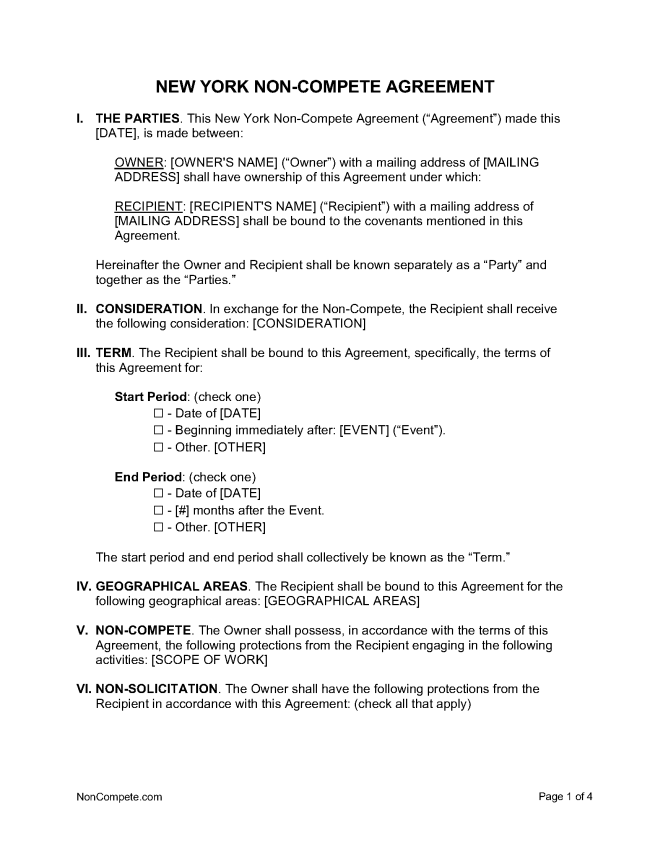A New York non-compete agreement is a contractual arrangement that limits an employee or business owner from pursuing a particular field or enterprise. Although non-compete agreements are generally disfavored, New York law recognizes that they are essential to certain business arrangements. New York courts pay incredibly close attention to the justification for non-compete provisions, referred to as legitimate interests.
Table of Contents |
Are Non-Competes Enforceable in New York?
Yes, but only if they are reasonable, meaning they:
- Are no more significant than required for the protection of an employer’s legitimate business interest;
- Do not impose an undue hardship on the restricted employee; and
- Are not harmful to the public interest.
BDO Seidman v. Hirshberg (1999).
Legitimate Business Interest
Interests that a non-compete agreement may validly protect include:
- Trade secrets;
- Confidential customer information; and
- Competition from a former employee whose services are unique or exceptional.
Reed, Roberts Assocs., Inc. v. Strauman (1976).
Employers also have a valid interest in preventing former employees from appropriating the good will of a business that was created at the business’s expense. (Arthur J. Gallagher & Co. v. Marchese (2012)).
Sale of Business vs. Employment Contract
Courts are more inclined to enforce a non-compete agreement that is ancillary to the sale of a business than one that is part of an employment contract and will generally do so as long as the agreement is reasonable. (Purchasing Assocs., Inc. v. Weitz (1963)).
Although it is not explicitly stated, it’s implied that non-compete agreements associated with the sale of a business have less obligation to prove the legitimate interest they are protecting. The buyer of a business is entitled to some protection of the business’s good will. (Borne Chem. Co. v. Dictrow (1981)).
Trade Secrets
New York is one of few states that has not adopted the Uniform Trade Secrets Act. As a result, the meaning of “trade secret” for purposes of a non-compete is not established by statute but by case law. (Ashland Mgmt. Inc. v. Janien (1993)).
Assignability
Non-compete agreements may be assignable. “Assignable,” in this context, means that if A signs a non-compete with Business X, and then Business Y buys Business X, A is bound not to compete with Y.
While some states prohibit the assignability of non-competes, in Abalene Pest Control Serv., Inc. v. Powell (1959), the New York appellate division found that assignability depends on the intent of the interested parties. This means deciphering whether the parties intended only to protect the employer involved or to create some asset for the employer’s business that could be sold to another party.
Prohibited Professions
Non-compete agreements that restrict a lawyer’s right to practice are not valid when contained in:
- An employment contract, partnership agreement, or similar document, except for agreements concerning retirement benefits (Rule 5.6(a)(1), New York Rules of Professional Conduct); or
- A case settlement (Rule 5.6(a)(2), New York Rules of Professional Conduct).
However, limited, reasonable restrictions may be included in contracts to sell a law practice. Rule 5.6(b), New York Rules of Professional Conduct).
Post-employment non-compete agreements may not prevent a broadcast industry employee from seeking employment in a particular geographic area, for a specific amount of time, or with a particular employer. N.Y. Lab. Law § 202-k.
Terminating an Employee
If an employee’s termination amounts to a breach of the employment contract, then the non-compete agreement is not enforceable. (DeCapua v. Dine-A-Mate, Inc. (2002)).
An employer must prove all elements of enforceability of a non-compete before the burden shifts to the other party to prove that it should not be enforced for some reason. (Brown & Brown, Inc. v. Johnson (2015)).
Continued Employment (consideration)
Continued employment can be sufficient consideration for enforcing a non-compete agreement. In Gazzola-Kraenzlin v. Westchester Med. Grp., P.C. (2004), the state appellate division held that an at-will employee entered a contract for a little more than 13 months of work. The employee worked for the duration of the contract. Because the employee could have been terminated at any time, her continued employment was adequate consideration to enforce a non-compete.
However, it’s unclear whether continued employment for a lesser period would be sufficient consideration.
Maximum Term
The length of time that a non-compete agreement can last depends on other aspects of the restraint, so there is no maximum term. Non-compete agreements must be reasonably limited temporally (and geographically). (Columbia Ribbon & Carbon Mfg. Co. v. A-1-A Corp (1976)).
Non-competes lasting two years (Contempo Commc’ns, Inc. v. MJM Creative Servs., Inc. (1992)) or less (Innovative Networks, Inc. v. Satellite Airlines Ticketing Centers, Inc. (1997)) are considered relatively short and have been regularly approved.
However, agreements that are reasonably limited in time will be struck down if they are unreasonable in some other way. In BDO Seidman v. Hirshberg (1999), the state high court held that an 18-month restriction was a reasonable amount of time but that the limitation was overbroad because it went beyond clients the employee had worked with while employed and hence unenforceable.
Blue Penciling (allowed)
Courts can modify or partially enforce a non-compete agreement if part of it is unreasonable. However, courts are not obligated to do so when there is evidence that the party seeking enforcement has engaged in overreaching or other misconduct. (BDO Seidman v. Hirshberg (1999)).
